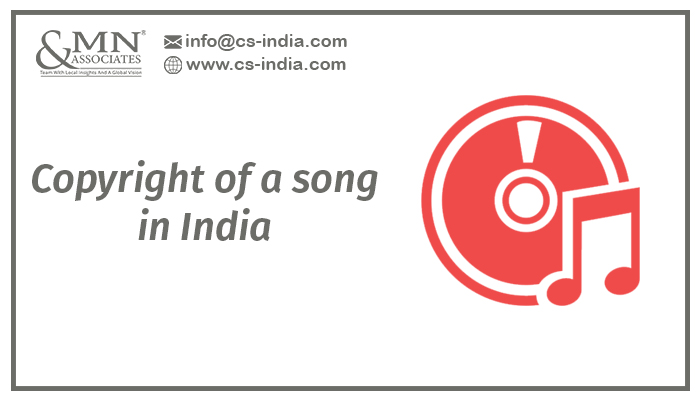
Copyright of a song in India
Copyright a Song – Copyright is one of the types of Intellectual Property rights (“IPR”) which is owned by the creator on his name. The other types of IPR include trademark, patents, and designs. Copyright includes literacy, dramatic, musical and artistic work and producer of cinematographic films and sound recording.
- A creator gets advantages over the content the creator produces. But, if registered under copyright gives a creator multiple rights and the safety to the creation from the infringement by others.
- Registration of works encourages the creators to produce more unique and innovative works, gives them a reputation, prevents duplicacy and safeguards usage in other works without specific permission.
- When such new work gets registered, it prevents the work from infringement and gives legal status to the creator.
The Copyright Act, 1957 (“the Act”) is notified with effect from 1957 with amendments to it from time and again helps the creators of new works to get recognition at the international level as amended by Copyright Amendment Act, 2012.
Procedure to copyright a song
Copyright a song falls under the category of Sound Recording and registering as requires step by step procedure to be followed by the creator to register its copyright is as follows:
- File an online application in Form XIV on the portal of copyright through the attorney along with the fee as prescribed, by the applicant or person authorized by him or her attorney.
- The application form should be enclosed with the Statement of Particulars (“SoP”) and Statement of Further particulars (“SFP”) signed by the applicant only.
- After the submission of the application, a dairy number is generated.
- Hard copy of acknowledgment slip and hard copy of application should contain a copy of Form XIV, SoP and SoFP, two copies of work irrespective of published or unpublished, original No Objection Certificate (“NOC”) from the publisher if the work is published by other than applicant, Copy of Power of Attorney if application is filed by advocate on behalf of the applicant to the Copyright Division in New Delhi.
- The applicant is required to send by registered post the copies of Form XIV, SoP and SoFP to every person who claims or have an interest in the matter of copyright (Copyright Amendment Rules, 2013).
- Applicant and Registrar of Copyright have to wait for mandatory 30 days to check and clarify for any objection filed by any third person.
- If no objection is received, then the application is scrutinized by the examiner before the approval of such an application.
- If the objection is filed, the registrar will hear from both the parties and after the objection, if rejected it will proceed for scrutiny by the examiner. If the objection is accepted, then the letter of rejection will be sent to the applicant.
- If in case after scrutiny, the examiner found any discrepancy, a letter of discrepancy will be issued to the applicant and after getting the satisfactory reply from the applicant in the prescribed time the Registrar will proceed further.
- After the completion of the process, the Registrar will send the extracts to the applicant.
Rights of Sound Recording
- To make any other sound recording embodying it.
- To sell or give on hire, or offer for sale or hire, any copy of the sound recording.
- To communicate the sound recording to the public.
Infringement of Copyright
Following are the acts which show infringement of copyright which are as follows:
- Making infringing copies for sale or hire or selling or letting them for hire;
- Performance of works in public where such performance will result in infringement of copyright;
- Distributing infringing copies for the purpose of trade which affects prejudicially the interest of the owner of the copyright ;
- Public exhibition of infringing copies by way of trade; and
- Importation of infringing copies into India.
The punishment for an infringement of copyright is imprisonment for six months with the minimum fine of Rs. 50,000/-. In the case of a second and subsequent conviction, the minimum punishment is imprisonment for one year and a fine of Rs. one lakhs.
In order to achieve creativity and protect the unique work of the performer, it is important to get our work copyright under the act to get certain rights and protection from the infringement in the future.
Can copyright be renewed?
No, there is no renewal of copyright under India law as neither registration or renewal is required for subsistence of copyright to work for its entire term.
The copyright Act provides protection as under:
- In the case of Literary, Dramatic and musical, artistic work – Lifetime of the author and sixty years from the beginning of the calendar year next following the year in which the author dies.
- In case of anonymous, pending work posthumous work, cinematographic films, sound records, government work, public undertaking, international agencies, and photographs – Sixty years from the beginning of the calendar year next following in which the work is published.
Need more guidance for IPR’s
write to us at info@cs-india.com
Also Read: Examine your patent applications with Patent Prosecution Highway
